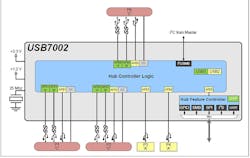USB 3.1 Hub Offers 10x Faster Data Rates for Auto Infotainment
As automotive manufacturers continue to add more functions to vehicles that integrate with mobile-phone applications, the role of USB is rapidly expanding. To support the driver-assistance and automotive-entertainment applications that are now all but standard on mobile handsets, Microchip launched its USB7002 SmartHub.
The OEM configurable USB 3.1 Gen 1 hub controller comes with four downstream ports and features for embedded USB applications. The company defines the term “SmartHub” as a USB hub that integrates system-level functions typically associated with a separate MCU or processor.
USB7002 enables a downstream device to take control of the host system by swapping roles and becoming the host port. It’s also able to switch between two different hosts if required. This role-changing technology, which Microchip calls FlexConnect, can be initiated through hardware or software commands.
USB7002 is compliant with the Universal Serial Bus Revision 3.1 specification and USB 2.0 Link Power Management Addendum. That means faster data streaming and shorter video download times, as well as improved in-vehicle communications. The hub supports native Type-C connectivity on the upstream port and two of the downstream ports. It includes internal Type-C CC pin logic and an internal USB 3.1 Gen 1 multiplexer to support both Type-C insertion orientations.
Shown is the USB7002 internal block diagram for an upstream type-C application.
The IC also enables communication to other peripherals in addition to USB. Its I/O bridging capability allows the host to interface to peripherals via I2C, SPI, or GPIOs over USB.
USB7002 supports 5-Gb/s SuperSpeed (SS) and legacy USB speeds through a dedicated USB 2.0 hub controller. Devices supported include 480-Mb/s Hi-Speed (HS), 12-Mb/s Full-Speed (FS), and 1.5-Mb/s Low-Speed (LS). The SuperSpeed hub controller operates in parallel with the USB 2.0 controller, decoupling the 5-Gb/s SS data transfers from bottlenecks due to slower USB 2.0 traffic.
The USB7002 handles downstream battery charging. Integrated battery-charger detection circuitry supports the USB-IF Battery Charging (BC1.2) detection method and most Apple devices. It provides the battery-charging handshake and supports the following USB-IF BC1.2 charging profiles: DCP (Dedicated Charging Port, a power brick with no data); CDP (Charging Downstream Port, 1.5A with data); SDP (Standard Downstream Port, 0.5A with data); and custom profiles loaded via SPI EEPROM or one-time-programmable (OTP) ROM.
USB7002 incorporates Microchip’s Multi-Host Endpoint Reflector, which provides USB functionality whereby USB data can be “mirrored” between two USB hosts (multi-host) to perform a single USB transaction. This capability is covered by the company’s patents and is instrumental in enabling Apple CarPlay, where the Apple iPhone becomes a USB Host enabling the graphical user interface of a phone to be displayed on a vehicle’s screen within a car.
Evaluation boards (e.g., the EVB-USB7002 demonstration/valuation platform) and development tools are available to accelerate the time to market for designs using the USB7002 IC. The part is AEC-Q100 certified and comes in a 100-pin (12 × 12 mm) VQFN RoHS-compliant package.



